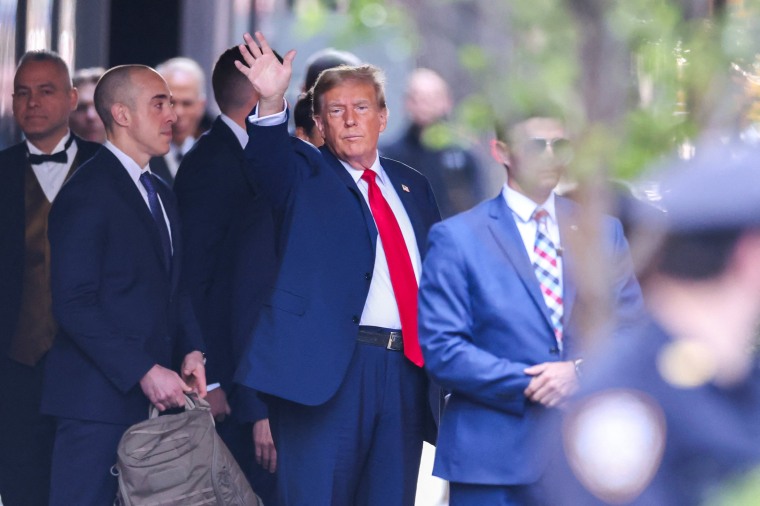This post was written by NBCNews.com
Donald Trump made history Monday as the first former president to stand trial on criminal charges — and the official start of jury selection quickly highlighted his polarizing impact on the public.
After the first 96 prospective jurors were brought into a New York courtroom, Judge Juan Merchan asked if any of those assembled could not be “fair and impartial.” More than half raised their hands and were excused from serving on the jury.
The watershed moment for American politics, the presidential election and Trump himself comes as Trump is the presumptive Republican nominee for president. He’s pleaded not guilty to 34 counts of falsifying business records, a low-level felony punishable by up to four years in prison.
“The name of this case is the People of the State of New York versus Donald Trump,” Merchan told the initial pool of jurors in the afternoon. Trump stood and turned around when he was introduced as the defendant, and gave the prospective jurors — some of whom were staring at him intently — a little tight-lipped smirk.
Trump had his eyes closed for a period of time as the judge was reading the potential jurors his instructions, and his eyes looked red and bloodshot when he opened them and peered at the judge.
After the court day concluded, Trump told reporters in a hallway the case is “a scam. It’s a political witch hunt. It continues, and it continues forever, and we’re not going to be given a fair job. It’s a very, very sad thing.”
The jury selection process started slowly — the pool wasn’t brought in until the afternoon, and after the initial group of those who said they couldn’t be fair were excused, another 9 were excused after saying they couldn’t serve for other reasons. By the end of the day 9 other jurors had answered preliminary questions — although one wound up being excused — and were scheduled to face follow-up questions on Tuesday morning.
The process also got off to a slow start because lawyers from both sides argued over some of the more sensational evidence that prosecutors from the Manhattan District Attorney Alvin Bragg’s office are hoping to use to show why Trump was eager to bury negative stories about himself during the 2016 presidential election.
Prosecutors allege then-candidate Trump took part in a scheme with his then-lawyer Michael Cohen and the publisher of the National Enquirer to suppress scandalous stories about him in the run-up to Election Day.
One of those stories involved porn star Stormy Daniels, who alleged she had a sexual encounter with Trump in 2006. Trump has denied the claim, and Cohen paid Daniels $130,000 in October 2016 to keep quiet about the allegation. After he was elected, Trump repaid Cohen in payments recorded as legal fees at his company —documents the DA alleges were falsified to keep the hush money payments secret.
The trial is an opportunity for the former president to face off with Merchan, whom Trump has frequently attacked publicly in the run-up to the trial. The judge addressed Trump directly at one point, issuing him standard court warnings that were made more dramatic by Trump’s status as a former president, his frequent public attacks on the judge and his many disruptions in his civil trials last year. “If you disrupt the proceedings we can proceed with the trial in your absence. … Do you understand?” the judge asked. “I do,” Trump replied.
Merchan also warned Trump that if he fails to show up in court without any explanation, a warrant would be issued for his arrest.
The back and forth came after Merchan had heard arguments about the alleged “catch and kill” scheme, the infamous “Access Hollywood” tape and the allegations of sexual assault from various women that came out during the campaign — all while Trump sat at counsel table with little visible reaction.
Merchan green lit a request from prosecutor Joshua Steinglass to show jurors during the trial some headlines from the Enquirer from the 2016 Republican presidential primary that they contend was part of the overall scheme to boost Trump, including stories trashing then-Trump rivals Ben Carson and Sens. Marco Rubio, of Florida, and Ted Cruz, of Texas.

The prosecutor said he also hoped to elicit information about the timing of Trump’s alleged affair with another woman whom the Enquirer paid to keep quiet ahead of the election, former Playboy model Karen McDougal. Steinglass said they didn’t plan to elicit “salacious details,” but did want to note that the timing of the alleged affair was while Melania Trump was pregnant with Trump’s child and the baby was a newborn. He said the information was relevant because it showed why Trump wanted to suppress it ahead of the election.
The judge said he’d allow testimony about the alleged affair, but not the information about Melania Trump.
Steinglass also asked Merchan to reconsider his earlier ruling that the jury not hear the notorious “Access Hollywood” tape, where Trump was caught on a hot mic saying he can grope women without their consent because “when you’re a star, they let you do it. You can do anything.”
Audio from the 2005 hot mic moment became public in October 2016, and prosecutors contend that’s why Trump was eager to silence Daniels. Steinglass also asked the judge to allow in a snippet from Trump’s deposition in writer E. Jean Carroll’s defamation case against him, where he defended the comment, saying, “Historically, that’s true with stars.”
Merchan said he still believes the tape itself is “prejudicial” and “should not come in” to evidence, but he said he would allow prosecutors to use a transcript of the tape. “The testimony from the E. Jean Carroll deposition should not come in either,” the judge added.
The judge also shot down prosecutors’ suggestion that they may try to mention other women who came forward after the “Access Hollywood” tape became public to accuse Trump of assault, calling it “complete hearsay.”
Later, prosecutors asked the judge to sanction Trump for posts they said violated a gag order barring him from publicly attacking witnesses. Prosecutor Christopher Conroy argued Trump should be fined $3,000 for three social media posts that were critical of Cohen and Daniels. “Not included is another post from this morning,” Conroy said, asking the judge to “remind” Trump that “he is a criminal defendant, and like all criminal defendants he is subject to court supervision.”
Blanche argued that the posts did not violate the gag order, and said Trump was “responding to salacious, repeated, vehement attacks by these witnesses.”
The judge did not immediately issue a ruling, and said he’d hear arguments on the issue on April 23.
Cohen told NBC News in a statement afterward that the proposed penalty was not severe enough. “Donald knows the damage his posts inflict on targeted individuals. A $1,000 per post fine will do nothing to curtail future violations,” he said.
In a ruling later in the day, the judge sided with the prosecution by giving Trump’s lawyers 24 hours to produce the exhibits and evidence they plan to use at trial. “You have 24 hours. Whatever you don’t identify in the next 24 hours, you will be precluded from using,” the judge told Blanche.
Trump maintains the DA’s case is part of a Democratic conspiracy against him, a claim he’s used to galvanize his supporters and rake in millions of dollars in fundraising for his campaign. Bragg, the Manhattan DA, is a Democrat, and Trump has falsely claimed that he’s doing the bidding of President Joe Biden.
The criminal case was the first of four brought against Trump in four different jurisdictions and is the only case definitively set to go to trial before the election.
Because Trump is required to be in court four days a week (the trial does not take place on Wednesdays), his ability to campaign in person is limited to times the court is not in session.
The jury selection process is expected to take one to two weeks. Two sources with direct knowledge of the situation told NBC News that 6,000 jurors have been called to the Manhattan criminal courts this week — 2,000 more than in a typical week.
During jury selection, eighteen jurors are put in the jury box at a time and each one in succession reads out loud their answers to a series of 42 questions. The questions include inquiries about what news sources they follow, whether they’ve ever attended any Trump rallies or anti-Trump protests, and whether they’ve ever supported the QAnon movement or antifa.
The form does not ask about party affiliation, political contributions or voting history, but the judge said answers to those questions “may easily be gleaned from the responses to other questions.” After the 42 questions are answered, prosecutors can ask the jurors a series of follow-up questions, and then Trump’s attorneys can ask their own follow-ups.
In court Monday, the judge told both sides the list of questions is “by far the most exhaustive questionnaire this Court has ever used.” “There will be no doubt how a prospective juror feels about Mr. Trump, the District Attorney, or the Court” when the jurors are done answering, he added.
The trial will have an anonymous jury, meaning the jurors’ identities and addresses will not be made public. The judge said the move was necessary because of “a likelihood of bribery, jury tampering, or of physical injury or harassment of juror(s).”
While the trial is the first criminal trial involving a former president, it’s the fourth trial in New York involving Trump as a defendant since he left office. He was sued twice by writer E. Jean Carroll for sexual abuse and defamation and he and his company were accused of fraud in a civil case brought by New York Attorney General Letitia James. The verdicts against him in the three cases — all of which he is appealing — total about $550 million.
